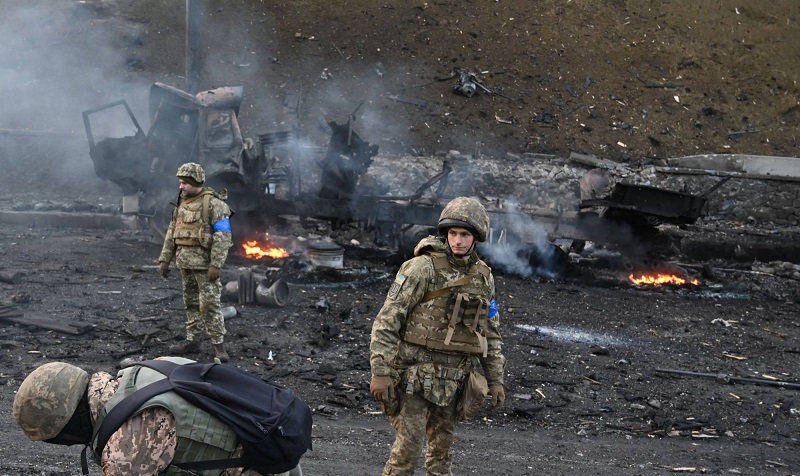War is back. We tend to think of the most recent conflict–WWI, WWII, Korea, Vietnam, Iraq, Afghanistan–as the “war to end all wars” (“we’re not going to do THAT again”), but, after awhile, another one breaks out.
Today, old fashioned artillery-bombardment, close combat wars have broken out between Ukraine and Russia and Israel and Hamas. And other potential threats to world peace–such as the prospect of China invading Taiwan–are looming.
As one of its vigorous practitioners said, “War is Hell.” And yet it sometimes seems necessary, if only in self-defense.
In an attempt to sort out the moral issues raised by war, Christians have formulated the so-called Just War Theory, which goes back to Augustine and was refined by Thomas Aquinas. Recently, one of its tenets has been raised in arguments that Ukraine should agree to a peace with Russia, even with unfavorable terms.
I’d like to lay out that argument, then challenge it, then propose a different framework based on Luther’s teachings about war.
Here are the principles of Jus ad Bellum, which can justify going to war:
(1) Just Cause. Not to annex land or change a regime, but to defend one’s country and to create the conditions for peace.
(2) Legitimate Authority. Only legitimate nations, under a Romans 13 chain of command, may go to war.
(3) Last Resort. War is undertaken only after peaceful means to resolve the conflict have failed.
(4) Proportionality. Is the cause worth the destruction and loss of life that the war will bring?
(5) Probability of Success. “There must be good grounds for concluding that aims of the just war are achievable,” as Wikipedia puts it. “This principle emphasizes that mass violence must not be undertaken if it is unlikely to secure the just cause.”
In relation to the war between Ukraine and Russia, Ukraine’s cause would seem to be just, whereas Russia’s is not. Both sides seem to have legitimate authority. I’m not aware of diplomatic negotiations or other peaceful proposals made by Russia before the invasion was lost. Russia has taken enormous casualties with little to show for it.
Though some of these points might be debatable, it would seem that Russia is not fighting a just war, whereas Ukraine is.
But what about the Probability of Success? Is Ukraine likely to win a victory over the much larger, much more powerful nation of Russia? If not, by this criterion, shouldn’t Ukraine sue for peace, rather than keep the war going at the cost of countless lives on both sides?
That is the argument made by First Things editor R. R. Reno in his article Just War Principles in Ukraine and Biola political scientist Tim Milosch in his article for Providence entitled The Just Statecraft of Trump’s Ukraine Diplomacy. They maintain that while President Biden was holding out for a Ukrainian victory, President Trump is rightly recognizing that this is impossible, so he is pushing for a realistic solution that will stop the war, even if this means Ukraine, whose cause is just but cannot be fully realized, must let Russia keep part of its conquest.
Mark Tooley, in another Providence article entitled Ukraine, Just War, & Success, takes the opposing view. He writes,
Just War teaching does not ask for an outnumbered nation under attack automatically to surrender or agree to highly unfavorable terms.
There are other considerations besides the size of contending forces. Larger nations do not automatically prevail against smaller nations. The latter are often better organized, better equipped, better led, more motivated, more unified, are wealthier per capita, have geographic advantages or better allies.
Tooley goes on to cite a number of cases in which a smaller nation prevailed against great odds or whose heroic resistance in the face of certain defeat proved valuable. Nations, he said, must consider
. . .whether conditions under submission or unfavorable terms would be worse than under war, whether the “peace” would only be prelude to further war, and whether there is a duty to allies or wider humanity to continue to resist. A nation facing extreme oppression, slavery or extermination will prefer to fight against great odds. And a nation, even realizing likely defeat, may see the moral imperative of resisting the aggressor so that future likely victim nations have more time to prepare.
On the one hand, the “probability of success” criterion would seem to be supported by Scripture:
Or what king, going out to encounter another king in war, will not sit down first and deliberate whether he is able with ten thousand to meet him who comes against him with twenty thousand? And if not, while the other is yet a great way off, he sends a delegation and asks for terms of peace. (Luke 14:31-32)
In context, though, Jesus here is not setting up rules for war, but offering an illustration about the need to “count the cost” of discipleship (Luke 14: 28).
If nations should just surrender to a superior adversary in the name of “possibility of success,” that would mean the Thirteen Colonies should never have staged the American Revolution against the British Empire, the Alamo garrison should have surrendered to Santa Ana, and Leonidas should have let the Persians pass through the gates of Thermopylae.
I do think realism is an important consideration when it comes to war. As Wikipedia notes, the “possibility of success” criterion “move[s] the conversation from moral and theoretical grounds to practical grounds.” The principle addresses not just the prospects of military victory but the possibility of achieving the goals of the war. The United States was very naive in thinking that Western-style democracies could be installed in Iraq and Afghanistan. The U.S. won the military victory, but there was no “possibility of success” in turning hotbeds of radical Islam into liberal democracies.
So I acknowledge Reno’s and Milosch’s point, though I think it could also be turned around: Russia’s goal was to occupy Ukraine and take down its government in a blitzkrieg attack. That turned out to be, to the Russians’ surprise, not possible, thanks to the ferocious defense the Ukrainians put up in defense of their homeland, which would support Tooley’s point. Now the war has ground on for three years and Russia’s war of attrition has exhausted both nations, as well as their allies. Both sides need to consider what is “possible” and work out a diplomatic solution in which neither party will get everything it wants.
More, though, needs to be said. Tomorrow I want to post about Luther’s views about Just War Theory, how he modified it, and how he proposed a simpler test.
Photo: TOPSHOT-UKRAINE-RUSSIA-CONFLICT by zhenghu feng via Flickr, CC BY 2.0













